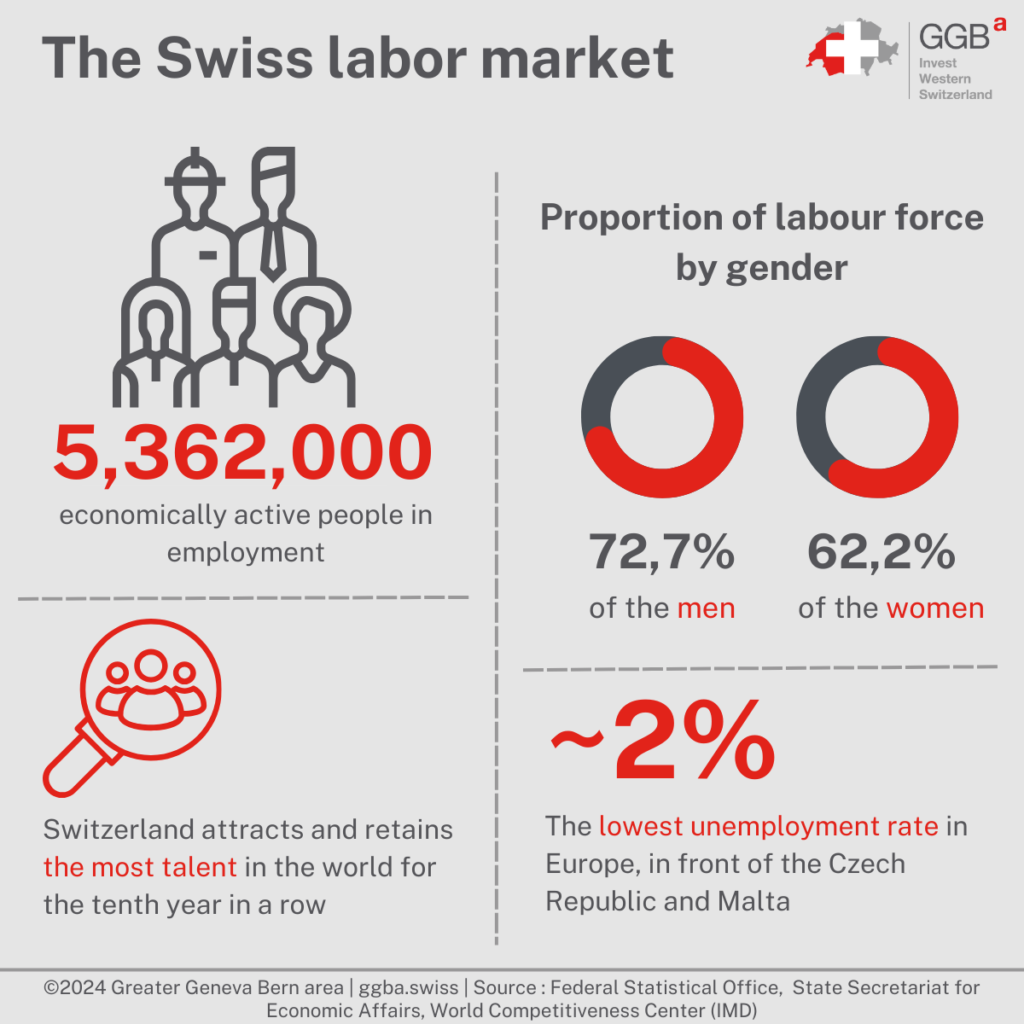
Employment contract in Switzerland: everything you need to know

The Swiss labor market is characterized by liberal legislation, light regulation, and exceptional social stability. In this entrepreneurial context, it is important to know the three types of contracts that bind the employer to the employee to fully benefit from the advantages that labor law offers to entrepreneurs.
1. The individual employment contract
The individual employment contract is a document signed by the employer and the employee that defines the rights and obligations of both parties in the employment relationship. The Swiss Confederation provides two models of employment contracts (one for a monthly paid job, the other for an hourly paid job) to help anyone who has to draw up an employment contract.
The following information must appear in an employment contract:
- Name of worker and employer;
- The date the employment relationship began;
- The function of the worker,
- Salary and any salary supplements;
- Weekly working hours;
- The date of the end of the employment relationship (only in the case of fixed-term contracts).
The employment contract must comply with the binding provisions of the Swiss Code of Obligations, the Labor Law, and any applicable collective bargaining agreements (discussed in the next section).
In addition to these obligations, it is also possible to include other rules in the employment contract, such as a non-competition clause. This clause, which applies both during and after the employment relationship, allows the employer to prevent the employee from using the specific knowledge he or she has acquired during the employment relationship to compete with the former employer. Contrary to many countries, it is not necessary to pay compensation to the employee in respect of his non-competition clause. However, the latter is subject to a certain number of constraints since it directly affects the economic future of the employee by limiting his or her possibilities of finding a new job in the same sector. To know the different constraints depending on the field of activity, it is recommended to contact professionals such as Greater Geneva Bern area.
2. The collective labor agreement (CCT)
The collective labor agreement (CCT) is an agreement between employers or employers’ associations and workers’ associations. In it, the social partners define minimum provisions (e.g. minimum wages, vacations, working hours, leave periods, or retirement age) that cannot be affected by individual employment contracts. There are many CCTs in Switzerland, for example in the private security sector, in the rental industry, or in the hotel and restaurant industry. To find out if there is a collective labor agreement in your field of application, you can consult the database of collective labor agreements (CCT) established by UNIA.
3. The standard employment contract (CTT)
For sectors without collective labor agreements (CCT), the federal or cantonal authorities can issue standard employment contracts (CTT), which define, among other things, the mandatory minimum wages. These conditions can only be modified if they are to be more advantageous to the workers.

Termination of an employment contract: notice period
Employment may be terminated in the following ways:
- Contract termination;
- Termination for change of contract (conclusion of a new employment contract with different conditions);
- Dissolution contract (mutual dissolution of the employment contract);
- Termination on a specific date (in case of fixed-term employment contracts);
- Retirement;
- The passing of the employee.
An employment contract can be terminated at any time by both parties without cause, subject to a notice period. The notice period is defined in the employment contract, the collective bargaining agreement for the relevant sector, or the collective bargaining agreement. If there is no contract or regulation, the provisions of the Swiss Code of Obligations apply:
- During the trial period (max. three months): seven days.
- During the first year of service: one month.
- From the second to the ninth year of service: two months.
- From the tenth year of service: three months.
These periods can be modified by a written agreement, but they can never be less than one month (except in the case of a CCT during the first year of service). In the case of employees in management positions, notice periods of up to six months are often set at the beginning of the employment. For the letter of termination to be legally valid, it must reach the other party before the start of the notice period. The termination of the employment contract must be communicated by registered mail by either party. A letter notifying the intention to terminate the contract must be received by the employer or the employee no later than the last working day of the month for the notice period to be effective for that month. The notice period begins after receipt of this letter and wages continue to be paid during the notice period following the employment contract. Final salary payment shall include a pro-rated 13th monthly salary and any remaining vacation balance shall be taken during the notice period or paid in full.
The party giving the leave must normally give reasons in written form if requested by the other party. There is no investigation to determine whether a leave of absence is socially unjustified, i.e. whether it relates to the employee’s personality or whether it is the result of an urgent necessity related to the operation of the business.
Termination without notice is possible under certain restrictive conditions: the continuation of the individual employment relationship must no longer be reasonable (e.g. in the case of fraud, refusal of work, or competition with the employer). A prior warning is required in most cases. In the case of just cause, termination without delay must be pronounced immediately (i.e. within a few days), otherwise the right will lapse.
There are periods during which it is impossible to notify an employee of his or her leave, for example in the event of illness, accident, pregnancy, military service, civil defense service, civilian service, or assistance missions abroad. Leave notified during such periods is void (untimely leave).
Technical unemployment and mass layoffs
Various reasons may force a company to take measures to reduce personnel costs. Overcapacity can be eliminated by temporarily reducing or completely stopping work. To preserve jobs, unemployment insurance pays employers in Switzerland who announce technical unemployment 80% of the loss of earnings of their employees for a fixed period. This measure is intended to prevent dismissals due to short but unavoidable periods of unemployment. However, employees have the right to refuse compensation for reduced working hours and continue to receive their full salary, but they run the risk of being dismissed. This is because dismissal is the last means left for a company to react to fluctuations in the level of employment. In the event of proposed mass layoffs, the Swiss Code of Obligations provides that the employer:
- Consults with and informs employees;
- Informs the cantonal labor office in writing.
In a nutshell: compared to the rules prevailing abroad, Swiss labor law provisions are very investor-friendly. Companies can hire and fire staff relatively easily, which allows them to remain flexible and reactive to the economic situation.
Greater Geneva Bern area (GGBa) is the investment development agency for Western Switzerland. If you would like to know more about employment contracts in Switzerland or about other subjects that could help you in your implantation, contact us.
Our articles ” Why Switzerland “can answer the questions you have.

